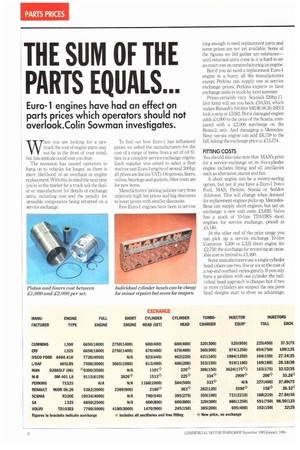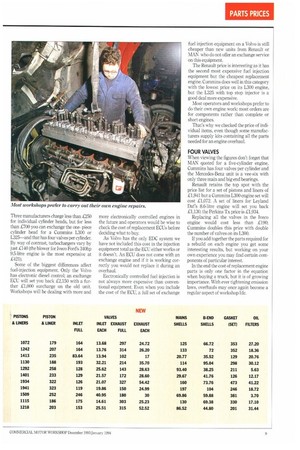THE SUM OF THE PARTS EQUALS...
Page 112

Page 113

If you've noticed an error in this article please click here to report it so we can fix it.
When you are looking for a new truck the cost of engine parts may not be in the front of your mind, but this attitude could cost you dear.
• The recession has caused operators to hang on to vehicles for longer, so there is more likelihood of an overhaul or engine replacement With this in mind the next time you're in the market for a truck ask the dealer or manufacturer for details of exchange units, including cost and the penalty for unusable components being returned on a service exchange. To find out how Euro-1 has influenced prices we asked the manufacturers for the cost of a range of items from a set of oil fil ters to a complete service exchange engine. Each supplier was asked to select a fleet tractive unit Euro-1 engine of around 300hp; all prices are list (ex-VAT). On pistons, liners, valves, bearings and gaskets, filter costs are for new items.
Manufacturers' pricing policies vary from relatively high list prices and big discounts to lower prices with smaller discounts.
Few Euro-1 engines have been in service long enough to need replacement parts and some prices are not yet available. Some of the figures we did gather are estimates— until returned units come in it is hard to set an exact cost on remanufacturing an engine.
But if you do need a replacement Euro-1 engine in a hurry all the manufacturers except Perkins can supply one at service exchange prices; Perkins expects to have exchange units in stock by next summer.
Prices certainly vary. Scania's 320hp 11litre lump will set you back £10,534, which makes Renault's 9.8-litre MIDR 0620.4SD/3 look a snip at £5382. But a damaged engine adds £4,000 to the price of the Scania, compared with a £2,000 surcharge on the Renault unit. And damaging a MercedesBenz vee-six engine can add £6,159 to the bill, taking the exchange price to £15,274.
You should also take note that MAN's price for a service exchange on its five-cylinder engine includes fitting and all ancillaries such as alternator, starter and fan.
A short engine can be a money-saving option, but not if you have a Euro-1 Iveco Ford, MAN, Perkins, Scania or Seddon Atkinson. This will change when demand for replacement engines picks up. MercedesBenz can supply short engines, but not on exchange: a new unit costs £3,826. Volvo has a stock of 10-litre TD103ES short engines for service exchange, priced at £ 4,180.
At the other end of the price range you can pick up a service exchange 10-litre Cummins L300 or L325 short engine for £ 2,750: the surcharge for returning an unusable core is limited to £1,400.
Some manufacturers use a single cylinder head; others use two, five or six so the cost of a top-end overhaul varies greatly. If you only have a problem with one cylinder the individual head approach is cheaper but if two or more cylinders are suspect the one piece head designs start to show an advantage. Three manufacturers charge less than £250 for individual cylinder heads, but for less than £700 you can exchange the onepiece cylinder head for a Ccumnins L300 or L325-and that has four valves per cylinder. By way of contrast, turbochargers vary by just £140 (the blower for Iveco Ford's 340hp 9.5-litre engine is the most expensive at L421).
Some of the biggest differences affect fuel-injection equipment. Only the Volvo has electronic diesel control; an exchange ECU will set you back £2,150 with a further £1,000 surcharge on the old unit. Workshops will be dealing with more and more electronically controlled engines in the future and operators would be wise to check the cost of replacement ECUs before deciding what to buy.
As Volvo has the only EDC system we have not included this cost in the injection equipment total as the ECU either works or it doesn't. An ECU does not come with an exchange engine and if it is working correctly you would not replace it during an overhaul.
Eectronically controlled fuel injection is not always more expensive than conventional equipment. Even when you include the cost of the ECU, a full set of exchange fuel injection equipment on a Volvo is still cheaper than new units from Renault or MAN who do not offer an exchange service on this equipment.
The Renault price is interesting as it has the second most expensive fuel injection equipment but the cheapest replacement engine. Cummins does well in this category with the lowest price on its L300 engine, but the L325 with top stop injector is a good deal more expensive.
Most operators and workshops prefer to do their own engine work: most orders are for components rather than complete or short engines.
That's why we checked the price of individual items, even though some manufacturers supply kits containing all the parts needed for an engine overhaul.
When viewing the figures don't forget that MAN quoted for a five-cylinder engine, Cummins has four valves per cylinder and the Mercedes-Benz unit is a vee-six with only three main and big end bearings.
Renault retains the top spot with the price list for a set of pistons and liners of £1,941 but a Cummins L300 engine set will cost £1,072. A set of liners for Leyland Oaf's 8.6-litre engine will set you back £1,130; the Perkins Tx price is £1,934.
Replacing all the valves in the Iveco engine would cost less than £190; Cummins doubles this price with double the number of valves on its 1-300.
If you add together the parts required for a rebuild on each engine you get some interesting results, but working on your own experience you may find certain components of particular interest.
In the end the cost of replacement engine parts is only one factor in the equation when buying a truck, but it is of growing importance. With ever tightening emission laws, overhauls may once again become a regular aspect of workshop life.
































































































































